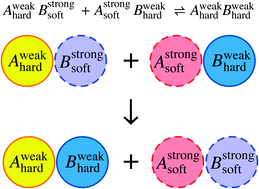
Although the broad concept of acid-base chemistry is familiar to anyone with a science GCSE, it’s more subtle nuances tend only to be revealed at a higher level. Acids and bases are described as having both a strength and an independent hardness, both of which are purely qualitative. Traditionally, strong acids and bases displace their weak counterparts, and hard acids and bases stick together. So far so good, but because these two traits are independent of one another, the two principles can sometimes be conflicting. Strong acids tend to be hard, and strong bases tend to be soft, but this does not always hold true.
Cardenas and Ayers characterise all acid-base reactions into four cases. In two of these, the hardness and strength principles reinforce each other, and in the other two they are opposed. They investigate which rule wins out in each case, and to what extent it dominates. Their findings are surprising and exciting, and could really have a serious impact as they provide a good deal of clarity to this issue. Reading this is highly recommended.
How reliable is the hard–soft acid–base principle? An assessment from numerical simulations of electron transfer energies
Carlos Cárdenas and Paul W. Ayers
Phys. Chem. Chem. Phys., 2013, 15, 13959-13968
DOI: 10.1039/C3CP51134K
by Victoria Wilton










